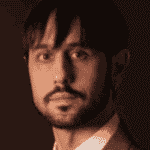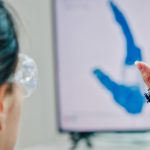May 30 is World Multiple Sclerosis Day. It is a day to raise awareness, learn and connect. That is why in this Cover Story we want to share the stories of two inspiring Globers who are going through this disease and have decided to help and motivate others.
But first, what is Multiple Sclerosis? This is one of the most common diseases of the central nervous system (brain and spinal cord). As of today, 2.8 million people around the world suffer from MS. (Source: https://worldmsday.org/es/acerca-de/ )
Read this article about David and Yolanda where they tell us about their life experiences and how they went through their process while inspiring us to live life more intensely.
David de Juan Calvo
Arquitecto de software en Globant – Madrid, España
“I’m never drinking again. My God! What an awful hangover.”
That was my first thought on May 15, 2000, when I woke up after a night of partying to celebrate my 21st birthday a week in advance. I noticed that below my knees, my legs felt numb, as if I couldn’t tell where they began and ended. It was a strange sensation: my hands were touching my calf and I felt the pressure but not the touch. I knew my skin was there because my hands were telling me so, but my legs were not giving me that information.
“Come on, take a shower and play the game, and you’ll get over it. But no more drinking tonight!”
As I was putting on my gloves in the locker room, I kept getting that strange feeling that something wasn’t right. I started the warm-up, and I couldn’t stop tripping, my legs weren’t as coordinated as they used to. I kicked the ball but the leg that kicked it wasn’t mine.
“Coach, I’m not ready to play, something is wrong with my legs. I’m going to the hospital.”
That was my last game.
At the emergency room of the public hospital of La Paz in Madrid they must have seen it clearly: “Take an MRI of your back and skull tomorrow, and come for a neurology appointment next week,” they told me. That was the beginning of 6 months of medical tests, MRIs, electroencephalograms, evoked potentials, electromyography…
By August, my legs had regained some sensation from going up and down the subway stairs, but I started to feel numbness and lack of sensation in my hands.
“September exams are coming…”
For 4 days, at the university library, I struggled to hold my pen again and manage to write legibly. I just wrote A, B, C, D… 0, 1, 2, 3…
In late September, sitting in the neurology waiting room with my parents beside me, I thought about how I was going to handle the diagnosis of what I did not yet know. I told my parents I wanted to enter the consultation room alone. I knew that whatever it was, I would first have to struggle with it alone. Maybe it was selfishness, maybe I wanted to protect my parents for a few more minutes from whatever was going to happen from that point on.
“You have multiple sclerosis.”
The little knowledge that a 21-year-old kid in 2000 could have about that disease was confusing and (why deny it?) full of preconceived ideas. Suddenly, what I suspected from the symptoms was confirmed. That was it for me.
I asked my parents to come in and help me remember what I was sure would be an endless amount of data and information. And I was not wrong. “We are going to do a lumbar puncture…, there is only one medication (interferon)…, it is likely that in 10 years your disability will lead you to a wheelchair…”
In the midst of all these “good news”, I remember looking at my hands, which had not yet fully regained sensitivity, and I asked:
“Will I be able to play the piano?”
“Yes, well, with patience…”
“That’s good, because I never knew how to!”
Silence filled the consultation room. The neurologist looked at me, then looked at my parents; my parents looked at me, then looked at the neurologist, and we all burst into laughter… Let’s face it, how many times can you act out a doctor joke in real life? There are some opportunities you just can’t miss.
I spent the afternoon in my room, locked up, thinking about the situation. By the time I got out at eight o’clock I had already made a decision: I would have to rush to live as many experiences as possible. I could not afford to leave anything for later because I didn’t know if I would be able to do it later.
Then came trips all over the world, projects of several months in Africa, Latin America and all over Europe, learning to ski, getting a diving license, pursuing university careers, master’s degrees… And countless anecdotes, stories, people and places that could fill whole books.
Luckily, science (blessed science) has advanced spectacularly over the last few years. From a preventive treatment, which required three weekly injections, we have gone to more than a dozen (one of them involves twenty pills every two years). Also, life expectancy has increased by almost a decade and the progression of disability has slowed down.
If I stumble, I fall, get up and use the cane. If my right hand doesn’t work, I type with my left hand. If I can’t hold a knife, I order a hamburger. I adapt my day-to-day life to my abilities at any given moment.
Are there things I would like to do but can’t? Yes, of course there are. I can’t run marathons like everyone else does or go down the Mariana Trench like Jacques Picard or step on the moon like Armstrong. Life is full of things you can’t do. The crux of it is to enjoy the things you can do.
Living with sclerosis means that many bad and unpleasant things can happen, but at the same time, you can take advantage of the good moments and live them very intensely so that when you close your eyes for the last time all you see are the experiences you had instead of the fact that you had an incurable and highly disabling disease. The fear of living with this Sword of Damocles is real and the future is always blurry and unsettling, but, in reality, everyone faces the same dangers and uncertainties. Simply put, in my case, the veil that prevents me from appreciating each moment as the most important has fallen and I have been able to understand that a plan for tomorrow is only a wish.
I have been quite fortunate because my situation has always been understood and respected in my work environment. I have met wonderful people along the way. However, when I arrived at Globant, I saw something that caught my attention: diversity is understood from the very corporate root and is part of the whole day-to-day operations. It is not just a presentation on their website. At Globant, there is a clear guideline that allows for the inclusion of people with a disability in a very natural way. It involves asking “What do you need to do your job at 100%?” and doing everything they can to provide it. My thanks and recognition go to my colleagues for the easy and natural manner in which they interact with me within the company: from the Champion, Vicky, who hired me, to my current mentor Adrian, and each and every one of the colleagues I have come across in the two and a half years that I have been part of this family. So many names pop into my mind that it is impossible to list them all: Romi, Carlos, Miguel, Carla, Diego, Yoli, Rakesh, Jitesh…
To all of you, THANK YOU for making “Be Kind and inclusive” more than just a slogan in a corporate presentation.
Yolanda Alfaro
Consulting Director en Globant – Madrid, España
July 2019
It was a Friday in July and Plaza de Olavide was full of people eager to share time and beers. I remember the harmonic noise of various conversations joining in a joyful uproar and my wish to return there after the doctor’s appointment.
Never would I have imagined that that hospital room would become an improvised office for a week for all those colleagues who decided not to leave me alone in the face of uncertainty. That paneled ceiling that for days was my only horizon is now far from here.
Barely two months had passed, but it felt like a lifetime. I remember the sky was very blue, I was wearing a polka dot dress, and I was incredibly happy. I remember the sun on my face and talking to my friend Helena. Feeling afraid when I entered the office. Wanting to run away. Mentally laughing at the scene. Trying hard to listen to my doctor.
But above all, I remember the conversation that changed everything.
The doctor —serious, direct— looked me in the eye and said:
“It’s Multiple Sclerosis.”
“Wow,” I thought to myself, “just when I was feeling so well.”
Silence
Just two words made everything around me fade away, triggering a shock wave that began erasing everything: the doctor’s face, her words, my friend’s hand that was now resting on my leg, the noise coming through the window, my plans, my life, my world.
The next thing I remember is being on a terrace, immersed in a silence I had never felt before, trying to recover that feeling that had been with me until just an hour ago. Just a few minutes, just a couple of words, had caused me to feel only winter inside.
Words matter
That day marked a before and after in my life. It was the beginning of a new phase in which I started to take into account a series of things that I had never even considered before. Or at least not until the moment when something unexpected and unwanted made me stop and realize that there was something wrong.
There are those who come into this world with a high degree of consciousness, those who acquire it naturally with little effort and those who, like me, need a strong jolt to open their eyes.
My jolt was the loss of health. The disease made me ask myself for the first time if my life was as normal as I thought it was; if my habits of work, eating, leisure or the way I related to others were the right ones; if my decisions in each of these areas respected my body and my feelings; if being always in a hurry and always doing a thousand things was so normal.
Then began a beautiful journey that is allowing me to discover a more honest way of living, one that is in line with who I am.
At 150 miles per hour, it’s hard to see the flowers
I have slowed down. I no longer want to rush, nor do hundreds of things. I only care about things that really interest me and doing them properly. I have learned to enjoy the silence and the pleasure of doing nothing. I have allowed myself to let go of things that were not good for me. And also, people. I eat healthier and do sports. I started to listen to my body and respect it. I quit smoking. I started to communicate in a healthier way, saying what hurts my feelings and what comforts them. I give thanks all the time. I accept things. I smile. I keep drinking beer.
In other words: I turned off the autopilot mode and took control of my own life.
Taboo
One of the things I learned throughout this journey was that, like politics, sex or death, illness is a taboo, something that is uncomfortable to talk about but that generates as much curiosity as rejection because it is part of our human condition.
Sickness is scary, because it is something that psychologically brings us closer to death, and death is the ultimate fear.
Why am I telling you this? Because in my case it was key to be able to talk about everything that was happening to me to get to the point where I am today. Talking was decisive when it came to losing my fear, accepting what was happening to me, understanding what I could face and what my options were.
Talking to my colleague and friend David, who went through this before me, made me see everything in a less traumatic way, which was key to normalizing the disease. Talking openly and being able to joke about some of its consequences not only helped me learn to live with the disease, but also helped my colleagues do so and we could continue to work as well as ever.
Each and every person with whom I have been able to share my experience has opened a door to the normality in which every employee should work, since one of the fundamental things to keep in mind is that not every disease leads to an inability to perform the tasks inherent to the job.
What for (instead of) why
Although it is true that no one in their right mind would wish to have an illness, it is also true that there is always a choice when it comes to living with it. Living with it is not the same as living for it. It is not the same to try to use it to bring out the best in you as it is to use it to justify your worst actions. There is always an alternative, and it is us and only us who have the ability to choose which path we want to take.
Of course, I would have preferred not to have been diagnosed with Multiple Sclerosis that Friday in July, but I try to focus on all the positive things the disease brought into my life.
So never let a few words change your life because a diagnosis is not a prognosis. Whatever happens to you, take a breath and look forward. Try to see everything as a new opportunity, as the beginning of a new adventure that may lead you down the most exciting paths of your life.
In my case, it’s working out that way.
We believe in the great power of uniting and building bridges between us to go further. We believe in the importance of building an increasingly inclusive and accessible present for all those who live with an illness or disability.
Today, people with disabilities represent 15% of the global population. At Globant, we believe that the inclusion of more people with disabilities in the labor market creates more diverse and open teams, ones with a greater ability to deal with situations that involve uncertainty. It is necessary to continue fostering inclusion and accessibility. Join our Be One of a Kind community and be part of this change here.





